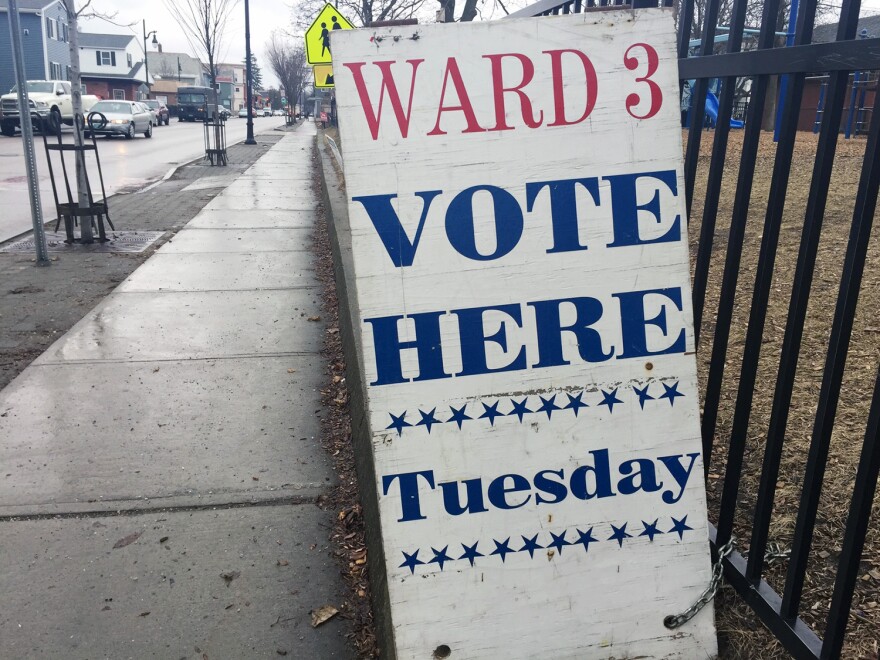Town Meeting Day for many Vermont cities and towns — big and small — is on Tuesday. On the ballots, voters will find a myriad of key issues, from approving local budgets to electing local leaders.
VPR's Mary Engisch checked in with Seven Days reporter Courtney Lamdin on some issues put in front of voters in Vermont's most populous city of Burlington. Their conversation below has been edited and condensed for clarity.
Mary Engisch: Let's begin with ballot issue number five. That's a measure to change Burlington's charter language. Can you explain more about what that language is? And why the change?
Courtney Lamdin: Right. So there's an item on this year's ballot that involves a provision in the city charter, which regulates sex work within city borders. So, specifically the document — the charter — says the city can have an ordinance, and I'll quote it, "To restrain and suppress houses of ill fame, and to punish common prostitutes in persons concerning therewith." So, obviously, no one talks like that anymore. A lot of people have said that this language is archaic and offensive, and that it should be scrubbed from the local law books.
The charter is what gives the city the legal authority to have ordinances such as that, and councilors have already repealed the prostitution ordinance. The argument now is that the charter should also be changed so that another anti-sex work ordinance couldn't be introduced down the line.
So, if voters did pass this, would it be substantial? Or is this language change mostly symbolic?
Yeah, there's been quite a debate over that. So the city — some city councilors and officials — say that this would be mostly symbolic, because prostitution, regardless of what's in the city charter, is still illegal under state law. So, if police want to make an arrest for prostitution, either someone providing or procuring it, they use the state statute — not the city charter.
But they are in debates about this at city council meetings. Some advocacy groups have charged that this charter change sends the message that Burlington is open for sex trafficking, which is a characterization that some of the advocates for this change say is misleading and inaccurate, and really has nothing to do with the other.
So, this was really meant to be kind of a housekeeping matter where the city is cleaning up kind of archaic laws that aren't used. But it's really ignited a debate about the merits of consensual sex work, and what that kind of portends for the city. So, it's been kind of an interesting conversation. Depends on who you ask whether it's just a symbolic move or not.

Courtney, can you walk us through a couple of the big ticket money items on the ballot? And then sort of a part two of that question with the amount of COVID relief money that Burlington received? How are these items being pitched to the public?
There are a number of items on the ballot that would raise people's taxes.
Obviously, there's the school budget, which is its own thing. But for the city items, there is a bond to improve Main Street that is being done through the city's tax increment financing district, so that one would not raise taxes on individual taxpayers.
But there are two others: a straight-up municipal tax rate increase, which obviously would. And another is a bond for various capital projects — bridges, sidewalks, all sorts of things that need fixing up.
So, with the municipal tax increase, that would be a 4-cent hike on the municipal tax rate, which would help cover what the city is anticipating is a $7 million budget gap created by inflation, some new programs that the city has implemented and shortfalls related to the pandemic. So yes, some of that gap will be closed with ARPA money — the coronavirus relief funds. But a portion of that gap does need to be filled with additional taxes from taxpayers. And that's why we're seeing this four-cent tax increase.
The mayor, however, has said that taxpayers could actually see an overall decrease in their tax bill, which is something people don't hear often. And that's because the school tax is expected to go down. So, that relates to a discussion happening outside the city regarding the education fund. There's a $90 million surplus in the state ed fund. And the governor has said he said he supports putting a portion of that surplus — giving it back to taxpayers, essentially. But that plan is really uncertain.
So, the Legislature would also have to approve that and voters won't know what will come of that when they head to the polls on March 1. So, while the mayor is hoping for that scenario, it may not come to fruition.
And currently Progressives on City Council are in danger of losing their power?
Yeah, so this is shaping up to be a pretty interesting election season. And that is definitely one of the concerns among city Progressives.
So, right now the council has 12 people. And the six Progressives can essentially — if they band together — they can create a tie vote, which allows them to block resolutions brought by Mayor Weinberger, who's a Democrat.
They don't want to give up that power. So, if a Democrat is able to kind of nab one of those seats that are currently held by Progressives, they can really tip that balance and make it easier for them and/or the mayor to push their agenda through.
Essentially, the Progressives have been a pretty powerful voting block in the last couple of years. And so I think that they're pushing pretty hard to maintain that power.
Have questions, comments or tips? Send us a message.





